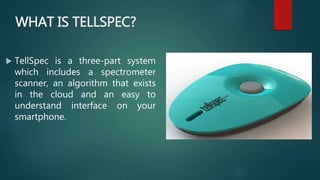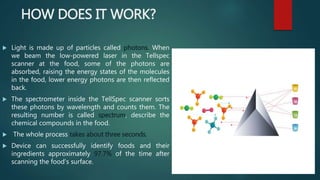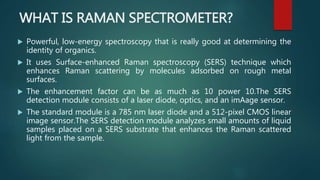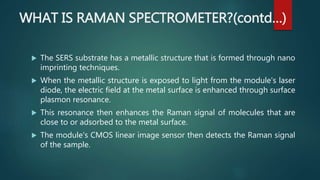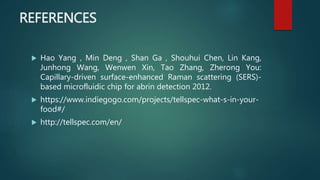Dietary Spectrometer Sensor
- 2. WHAT IS TELLSPEC? ïĩ TellSpec is a three-part system which includes a spectrometer scanner, an algorithm that exists in the cloud and an easy to understand interface on your smartphone.
- 3. HOW DOES IT DO? ïĩ TellSpec analyzes the findings using the algorithm and sends a report to phone telling you have allergens, chemicals, nutrients, calories, and the ingredients present in food.
- 4. HOW DOES IT ķŲ°ŋ?(ģĶīĮēÔģŲŧåâĶ)
- 5. HOW DOES IT WORK? ïĩ Light is made up of particles called photons. When we beam the low-powered laser in the Tellspec scanner at the food, some of the photons are absorbed, raising the energy states of the molecules in the food, lower energy photons are then reflected back. ïĩ The spectrometer inside the TellSpec scanner sorts these photons by wavelength and counts them. The resulting number is called spectrum, describe the chemical compounds in the food. ïĩ The whole process takes about three seconds. ïĩ Device can successfully identify foods and their ingredients approximately 97.7% of the time after scanning the food's surface.
- 6. WHAT IS RAMAN SPECTROMETER? ïĩ Powerful, low-energy spectroscopy that is really good at determining the identity of organics. ïĩ It uses Surface-enhanced Raman spectroscopy (SERS) technique which enhances Raman scattering by molecules adsorbed on rough metal surfaces. ïĩ The enhancement factor can be as much as 10 power 10.The SERS detection module consists of a laser diode, optics, and an imAage sensor. ïĩ The standard module is a 785 nm laser diode and a 512-pixel CMOS linear image sensor.The SERS detection module analyzes small amounts of liquid samples placed on a SERS substrate that enhances the Raman scattered light from the sample.
- 7. ïĩ The SERS substrate has a metallic structure that is formed through nano imprinting techniques. ïĩ When the metallic structure is exposed to light from the module's laser diode, the electric field at the metal surface is enhanced through surface plasmon resonance. ïĩ This resonance then enhances the Raman signal of molecules that are close to or adsorbed to the metal surface. ïĩ The module's CMOS linear image sensor then detects the Raman signal of the sample. WHAT IS RAMAN SPECTROMETER?(contdâĶ)
- 8. REFERENCES ïĩ Hao Yang , Min Deng , Shan Ga , Shouhui Chen, Lin Kang, Junhong Wang, Wenwen Xin, Tao Zhang, Zherong You: Capillary-driven surface-enhanced Raman scattering (SERS)- based microfluidic chip for abrin detection 2012. ïĩ https://www.indiegogo.com/projects/tellspec-what-s-in-your- food#/ ïĩ http://tellspec.com/en/

